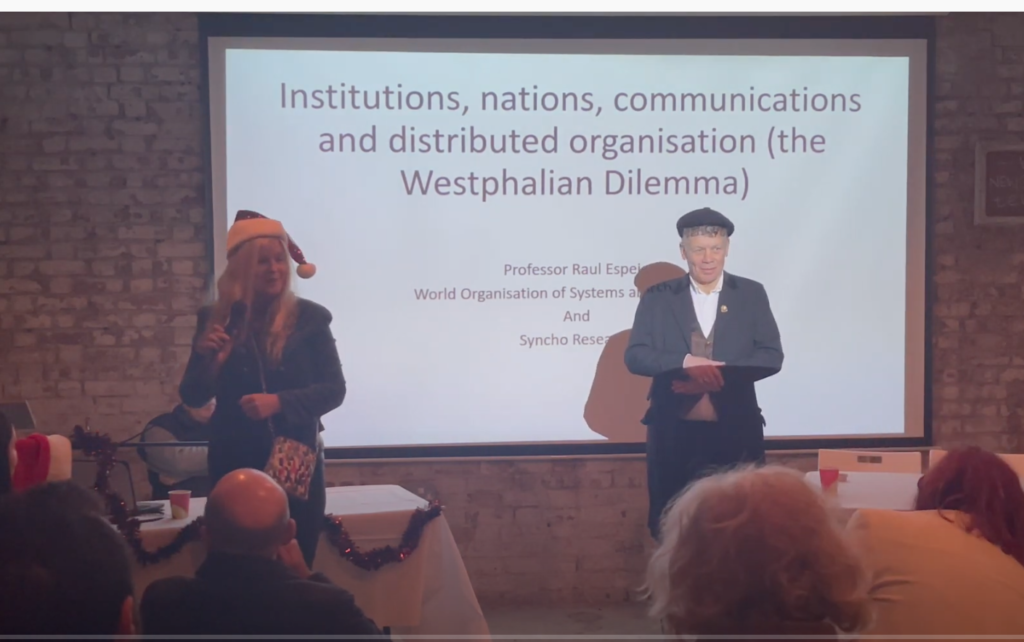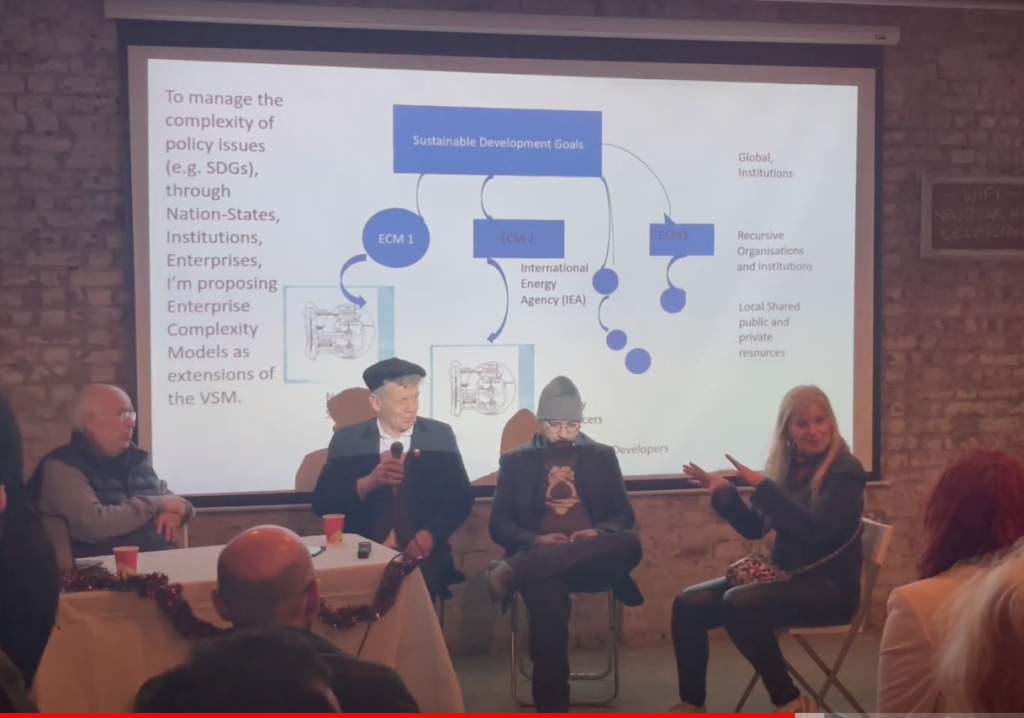What can we learn from Cybernetics to help us in post-Covid recover?
Raul Espejo on Cybersalon Xmas Lecture – 8th Dec 2021
We were hugely lucky to host Professor Raul Espejo at Cybersalon Xmas Lecture just before Covid-Omicron struck again.
Raul is the pioneer of Cybernetics and CYBERSYN system in Chile, on which he worked with Stafford Beer. He is now based in Lincoln and came out to London to join us at Newspeak house and to discuss how modern cybernetics can help to break the gridlock of global crisis and nation-states organisations.
Hosted by Newspeak House, in Shoreditch, we discussed what Cybersyn pioneers would say about our chances of ‘bouncing back better’, breaking up barierrs of nation-states and deloping new organisations that can support global action for global problems.
To optimise or to re-boot, this is the question (or one of many).
The Key Takeaways
From Stafford Beer, Janos Kornai to more modern Viable Systems Model, cybernetics could help us to point at solutions for our current predicament.
How do you balance rapid adaptation to new circumstances with making sure you don’t fall over is the question for 2022.
Raul Espejo worked on the original Cybersyn in Chile in 1971-1973 during presidency of Salvador Allende. He has escaped safely and then has been lecturing world-wide on the future use of decision making systems. He was associated with Lincoln University and is a proponent of inclusive democracy using multilevel feedback tools.
Key points:
- Politicians need to lead but they also need to listen – that is a prerequisite of inclusive democracy.
Raul notes that in the 70ties, the broadcast nature of TV encouraged politicians to shout from their TV studios and give long lectures. There was no feedback from the people, as TV was a one way medium. People couldn’t respond, correct or answer.
Today, the people shout on Twitter, Facebook, Redit and Instagram, but there are no tools that the politicians can use to ‘listen’.
Millions of messages and hundreds of hashtags create a situation when politicians can only ‘react’ and be in constant ‘crisis management mode’. Politicians latched on to Survey Monkey type of Polls (see YouGov) to make sense of what people are saying, but those tools are both easily manipulatable (who do you call on the phone and who do you email at what time gives radically different answer) and they are not truly representative.
What mechanics do we need to put in place to allow inclusive politics and listening ?
- Cybernetics are often misunderstood as top-down, authoritarian party tool.
Raul explained that this is a misunderstanding – at the core of the cybernetic concept is a feedback process.
We need to work to embed feedback in all three levels of governments machinery – from Policy, to Regulation, to Implementation. This is not easy, but we have Machine Learning and new Natural Language Processing technologies that can help to makes sense of Big Data feedback from the people at every level.
- Raul noted that current problems we face, are of global nature, with Covid, climate Change and Refugee crisis all requiring joined cross- national efforts. But nation states have an introverted lens, inwards looking political voting systems and there is a tension between national interests and global problems.
Today, in rich countries, politicians focus solely on satisfying their national voters, and will not ask for sacrifices needed to solve global problems as fearing of lost votes.
It is a classic ‘head in the sand’ tactical behaviour.
But the problems will not go away only because we in the West are not looking. Cybernetics can help in bringing the voices and feedback from those affected in the short term, avoiding crisis later. Problem faced is often problem solved.
- During the discussion on future of systemic adaptation to Climate Change with Raul Espejo, Dr Richard Barbrook, (Westminster University) Eva Pascoe (Cybersalon.org) and Edward Saperia (Dean of Newspeak House) shared their observations on the need of new, positive examples of inclusive cybernetics at work.
Also, we noted that ‘global problems’ are just too big to handle, we need to find ‘owners’ of those problems, identify the level of resource needed to tackle each element, and find a way
Next session will be focused on multi-level feedback tools for inclusive democracy, from Taiwan, Canada and Poland.
Reading List
Raul Espejo Slides – Christmas Lecture Cybersalon
Performative approach towards a sustainable environment; the Viplan Methodology (DRAFT) by Raul Espejo, Syncho
Dr Richard Barbrook – author of Imaginary Futures
Eva Pascoe chair of Cybersalon.org and author of sci-fi short story on future elites The Summoned
Edward Saperia – Dean at Newspeak House


